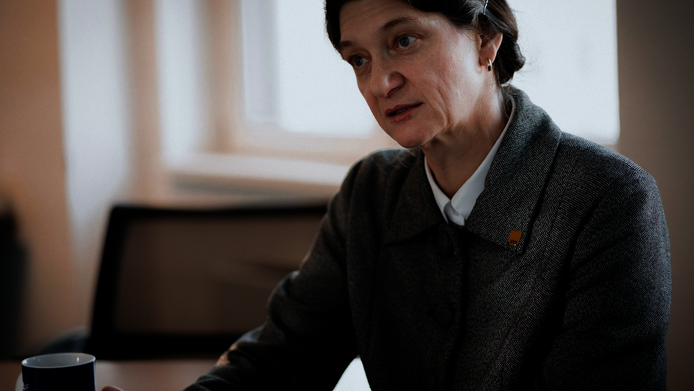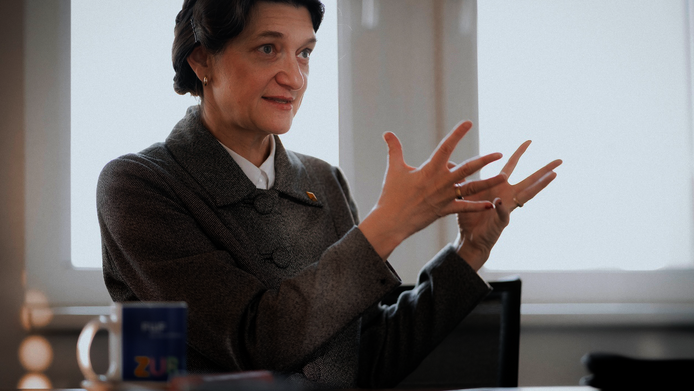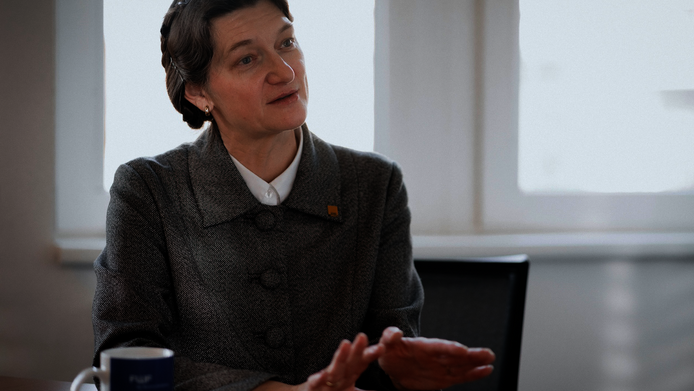“The excellent women researchers are right here”

FWF: The FWF plans to restructure its career development programmes. This raises questions about equal opportunities and the promotion of women. For this reason, the Science Fund conducted an intensive consultation process in recent months in which you were involved as an expert on gender equality issues. How did that go?
Edith Gößnitzer: In my capacity as chairperson of ARGE GLUNA (Task Force for Equal Treatment and Equal Opportunities at Austrian Universities), I was asked to participate in this process, involving several working groups. The spokespersons of the individual groups were free to nominate additional participants. That was a great offer on the part of the FWF. From my point of view, this led to a very successful team selection and created a basis of trust right from the start as well as the motivation to seek a positive outcome. We were thus able to conduct an intensive exchange of views at a high level. Our group of gender equality experts was very active, and our ideas and suggestions were well received and incorporated throughout and after the meetings. Incidentally, I also appreciated very much that the Ministry [of Science] was represented in our group, on behalf of society at large, if you will. Such a strategic bundling of expertise can achieve a great deal. It was exciting to learn about the FWF’s ideas. As a funding institution it has a modern notion of research and wanted to communicate to us how it would like to react to current challenges in the world of science through up-to-date “types of research” that served us as an example throughout the process. Today, research is increasingly inter- and transdisciplinary. It is exposed to global competition and has become more open. There are also many women who spur unconventional research. And this is how I see the FWF's efforts, namely as encouragement to be more self-confident and to expect research institutions to assume more responsibility.
FWF: The first phase of this process is over. What were the results?
Gößnitzer: If everything that was laid out here is pushed through, then it would be a genuine leap forward, within the FWF as well. There are good ideas and proposals which can be implemented and where examples already exist in other countries. We have looked at Swedish models, for example, concerning the promotion of women, in order to make further progress here. The Austrian Science Fund has always been a funding institution that paid attention to gender issues. At the beginning of my career in the male-dominated environment of chemistry, I myself benefitted.
FWF: Can you cite a few issues that were discussed?
Gößnitzer: A central aspect of the planned two-stage career development programme will concern the selection and review phase, which is part of the funding process and thus has an impact on the structures. Gender awareness will then be even better anchored in all areas: among the reviewers themselves, in respect of the content of research proposals or the selection process, where a 50:50 gender quota is foreseen. In recent decades, the focus has been on women and how they can seek better qualifications as individuals. They have done that now. The excellent female researchers are there to stay, and that includes the natural sciences, if you look at the numbers of female graduates. Now we have to take the next steps.
FWF: The situation is different as regards top positions.
Gößnitzer: That's right, when it comes to professorships, the figures give a different picture – there, women are still very much underrepresented. But there is definitely a new generation poised and ready, as the FWF has also seen in its own statistics. So, the situation could be different with respect to high-level positions as well, but this requires structural adjustments. Typically, the time when you become established at the forefront of research, between the ages of 30 and 40, coincides with family planning. For this reason, programmes were set up specifically for women, which were not really outstanding in terms of scope and resources, but which were nevertheless very well received by women scholars as well as by the institutions. That was important and good, but it created a certain imbalance. The FWF is responding by saying there is enough potential, we can now go further and do more. It is obvious that the German-speaking countries still have some catching up to do when it comes to equality and diversity, also from a societal point of view, and this is reflected in the science disciplines.
FWF: So, we no longer need an explicit support regime for women?
Gößnitzer: That is true for some sub-areas. In others there is still some catching up to be done in terms of statistics, but not in terms of quality. Our working group therefore recommends to pay attention to the various disciplines. To make sure, for example, that there is not just one woman professor in mathematics, so that a critical mass can develop. In this way, the surrounding context will change. But in this field, again, it is a question of doing something about the structures. There are qualified women, but they depend on the willingness of the given research institution to keep them and offer them prospects. This is also one of the ideas of the FWF – to combine its funding measures with a requirement for a more binding commitment from universities and research institutions.
FWF: More funds for career development and equal opportunities for women and men are central measures of the FWF in its reorganisation of programmes. Flanking measures that have already proved successful, such as support for women's networks or for care obligations they may have, will be retained. How important are such additional measures?
Gößnitzer: Interestingly, all women's programmes include such flanking measures to a much greater degree than other programmes. So there is a certain bias here as well. This should be removed when the new programme tracks are in place. The academic system is well equipped to offer employment models that support reconciling work and family life. This should include all funding tracks and not just be a bonus in women's programmes. What I consider to be very positive in the new programme design is the 50:50 quota. This gives women the same opportunities and opens up new perspectives. In the biosciences, for instance, women already are in the majority today, and their number is also growing in physics, mathematics and computer science.
The Montanuniversität [university of mining sciences] in Leoben or the University of Linz have shown what is possible when women are specifically targeted, and this is exactly what happens with the quota system. Women researchers can now relinquish the “women’s zone”. This means, one needs encouragement to break free of certain traditions. Promoting women is part of the mainstream today. That’s where you need to look and that is now being made possible. The quota system will hopefully motivate institutions also in the first stage of the career development programme to encourage more women to espouse and stay in research.
FWF: Does this mean these FWF measures will also percolate to disciplines where more pronounced gender inequality still exists?
Gößnitzer: I would think so, particularly through the flanking measures, which are anchored in the structures, for instance in the review process. Here the awareness for equality should be further strengthened. The FWF has innovative ideas in this area, such as giving the reviewers positive feedback when they consistently take these aspects into account. If the reviewing quality can be improved yet again, and I can see this as a likely consequence, something quite essential will have been achieved. It will also support the extension of the equality criteria to the other FWF programmes, which the FWF intends to do. Consideration is also being given to how overall gender competence can be strengthened and implemented in daily university activities and in the science system. The FWF can make a big difference here by signalling that the funds are available and tied to certain requirements. This will motivate the institutions to pursue the same empowerment of women.
FWF: What about women themselves, is it important to continue to address them in a targeted manner?
Gößnitzer: That will be necessary and is definitely important, precisely because there remain certain disciplines where women’s confidence in a scientific career still needs to be nurtured. I assume that it will actually happen: positive communication and addressing women quite specifically to make them aware of what their improved chances are. One must also ensure that women do not get the feeling that something of the little they already have is being taken away from them – some women scientists have apparently formed that impression. They will, to the contrary, benefit from more resources and opportunities than before. Making the positive developments very visible will also be important. The facts and statistics will then show where adjustments are still needed. If an institution does not achieve 50:50, it will have to initiate timely support measures and increasingly take care of emerging young talent. In future, the best female researchers will go where they find favourable conditions, while others will have a competitive disadvantage. Diversity and gender fairness is also an inspiring environment for research. The FWF can achieve this by acting on the structures to minimize outcomes such as the “leaky pipeline”.
FWF: The second stage of the career development programmes is intended to support outstanding researchers at an advanced stage of their careers and, in particular, provides for better docking with the respective research institutions. Could this be decisive in counteracting the glass ceiling and similar effects?
Gößnitzer: Yes, I am convinced it could. It’s true that in the early phase of career advancement we are still at the level of individual support. In the second stage, the researchers have more visibility and the competition gets fiercer. It is also a question, therefore, of reputation and competition for both sides, the researchers and the institutions. What is at stake there is achieving international visibility for outstanding scholars. So there is also the aspect of how institutions deal with these researchers and what image of research they want to convey. Should it still be the image of the lone fighter, which still exists, or should it be about how scientific disciplines advance through cooperation? I believe that universities, as institutions oriented towards diversity, have more innovative power than they might think.
FWF: How important are role models, i.e. successful women researchers who may also be inclined to show their solidarity, as examples for bringing more women into executive positions?
Gößnitzer: It is important to put successful researchers, both men and women, in the limelight without overtaxing them. The FWF has supported the visibility of successful women in science, such as at the annual celebration on 8 March, International Women's Day. Mentoring and support for the network of female researchers are also measures that will be maintained. I think it is great that the FWF has adopted a systemic approach with the aim of having equality simply taken for granted, especially in contexts where there might be resistance. Much has already been achieved, but this systemic change is needed to alter the image of scientific research, a process that is already happening today. 50 years from now I would probably no longer speak of myself as a woman chemist. There will be other notions of research and combinations of subjects that we are unaware of today and that will significantly change the traditions of science. Funding institutions can make an important contribution in this context by opening up new research perspectives and permitting innovation through diversity.
Edith Gößnitzer has been an expert on gender equality issues in the science domain for many years. She is the chairperson of ARGE GLUNA, the umbrella organisation of the task forces for equal treatment and equal opportunities at Austrian universities. A pharmaceutical chemist by training, she teaches and conducts research at the Institute for Pharmaceutical Sciences at the University of Graz.
Further reading







